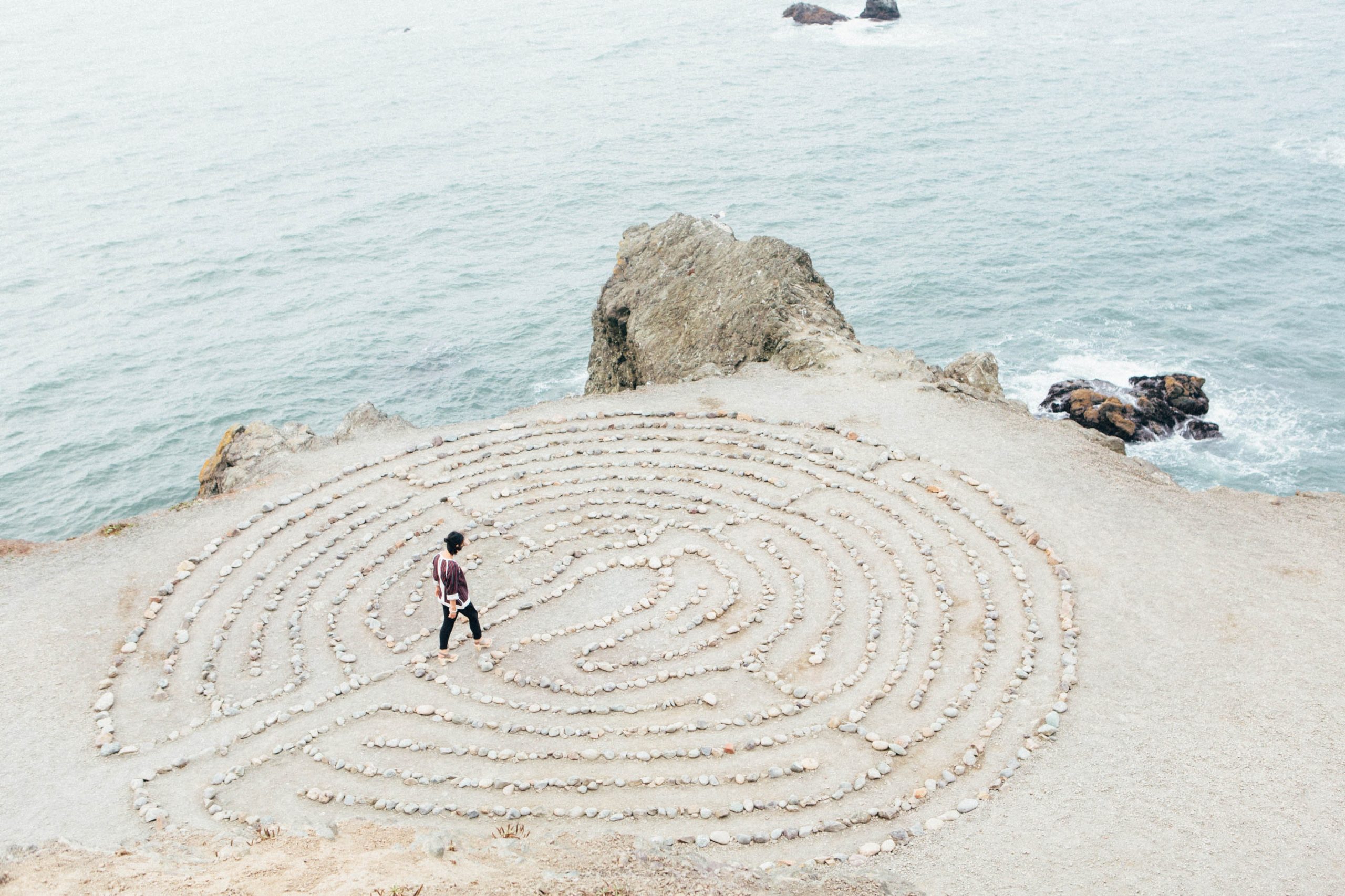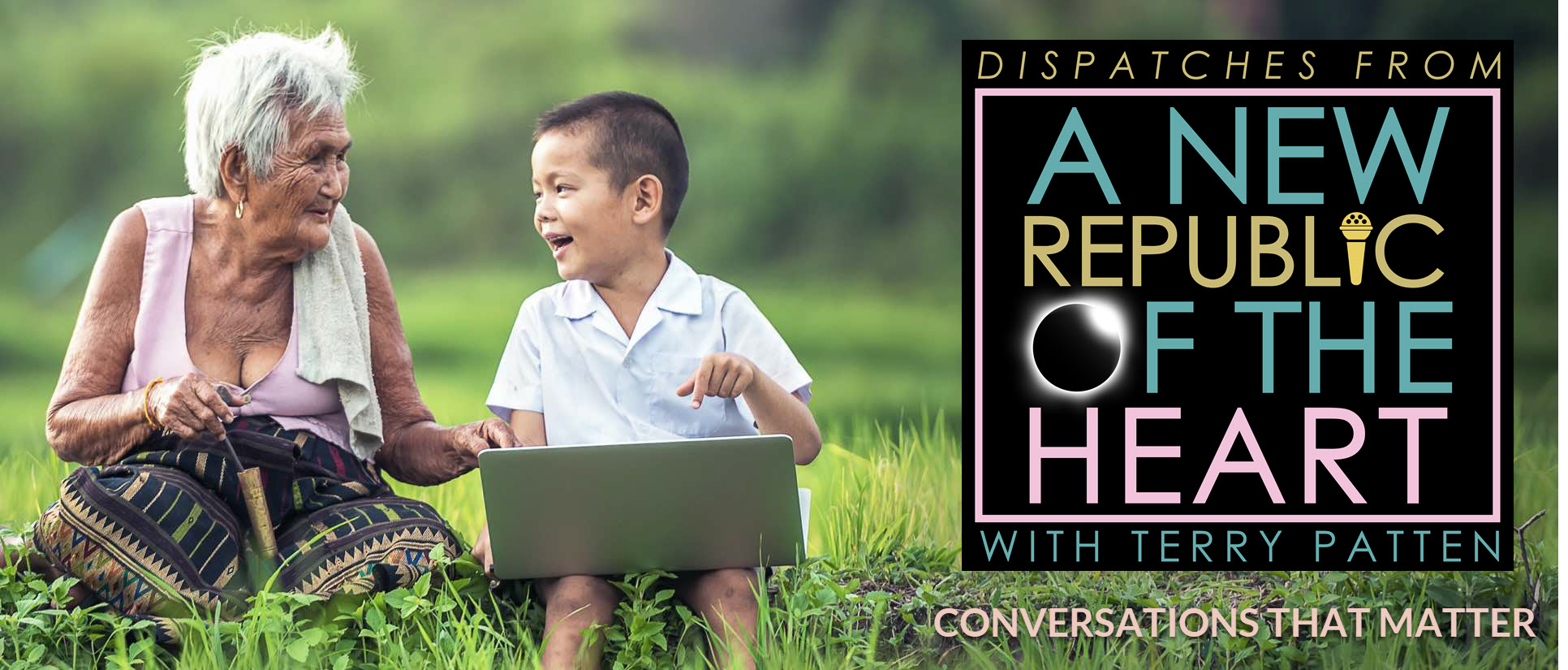Sitting in my cozy armchair, staring out the window at the few remaining mounds of dirty snow, brown trampled grasses, the wall of dark forest green pines behind my neighbor’s barn, with my face in the long leafy strands of my Ivy plant and my mind on something far, far away, a thought comes to me. I love my Ivy. I love the story of where it came from. I love the people in that story and the reason that this Ivy has a home beside my chair today. I feel the love warming my heart, warming my whole being. In fact, I tuck my face further into the leaves, kiss a couple of them and shed a few tears.
Then a flood of thoughts wash over me. Thoughts of all the people, places, experiences, plants, animals and adventures I’ve loved so deeply in my life. I marvel that I’ve known my Asparagus Fern for 50 years. I think about OakieDay, my incredible, blind black Labrador retriever who died 10 months ago. I used to lie on the floor behind him, throw my arm over his back and scratch his chin and chest, my face buried in the fur on the back of his neck, cooing, “Blaaack dog. You’re such a good boy, Oakiedokey.” I miss his living heart and his unconditional love although I know his spirit is still very much alive, resting on the floor beside my feet as I write.
Love is so powerful, isn’t it? When we love someone or something, everything is right with the world. So why don’t we practice weaving love into each and every one of our living moments? Love is never a chore or a burden. It bursts out of us involuntarily and rests comfortably inside our hearts at all times. Certainly, when we lose someone we love, there is pain and heartbreak to endure. But it’s been said many ways by many learned people that the depth of the pain we feel from losing love is but a measure of how deeply we loved in the first place. We humans are helpless in the grip of love and yet our souls are fed, enriched, and inspired by it. Today, at the window, I think about how I continue to love even in the face of heartbreak and loss. Why would I ever think that love is a problem? How can I forget that it’s love that keeps me strong? Why do I tend to cling so tightly to suffering instead of to love?
Deciding it’s time to go out into the fresh air, I pull my chunky sweater over my head, grab my phone, and head out for a walk. The Earth smells lovely in Vermont in the Spring. Dead leaves offer a spicy fragrance as I kick through them. My eyes tear walking in and out of the pockets of colder air hovering around remaining patches of snow. The muddy roads have a wet, loamy smell that I find divine, although Spring mud can be as tricky to walk on as ice in the winter.
It’s mostly flat where I live now, making a robust walk difficult. You know. A really good walk has some ups and downs in it. But mine today is still quite a nice walk; crisp air with a touch of warmth from the sun. So over to the neighborhood church I go and around the parking lot a few times before heading back home. On my way, another thought comes to me. What if I identify each and every moment that I find something to love? My walk will have added value and my conscious thoughts will play a more vital role in my day. Isn’t this the practice I keep saying would make a difference in my life? Admittedly, many wise people have suggested this very thing, too, and I nod in agreement every time I hear it uttered but, as yet, have failed to make this one of my daily practices. Now is the time, I think to myself.
As is always the case, it’s easy to notice many things to appreciate while I walk; an almost perfectly round stone in the middle of the road, the fragrance of the mud, a robin on the church lawn. Today, every time my eyes light on something I appreciate or my ears hear a familiar sound, I say ‘now’ under my breath. The crow flying overhead. Now. A child’s voice up the road. Now. The row of Maple trees. Now. A dog barking. Now. The dirt road. Now. All the grasses, brown though they may be. Now. The song of a Wood Thrush. Now-now-now! Oh, how I love the Wood Thrush’s song! It’s not long before I’m saying ‘now’ with every step.
More than a minute full of ‘nows’ woven together by the practice of being in love with each moment. Surely, this must be something all our hearts can hold. As Ram Dass noticed, “Everything changes once we identify with being the witness to the story instead of the actor in it.” With every whispered ‘now,’ my heart interacts with life in a way that keeps me focused on the miracle and mystery of it. And I revel in my small but valuable part as a witness to its splendor and God’s limitless, magical love.
But the deepest lesson from today is about to unfold and will not be an easy one to speak of because it holds an uncomfortable paradox: how does one keep living in love when suffering and death are in full view? Is it possible for mere humans to hold grief and joy in their hearts at the same time? I’ve heard that it’s possible – that there are people able to hold both immeasurable amounts of joy and immense levels of heartbreak in their hearts at the same time. Can I? I’m encouraged by their experience to keep opening to all I can learn. Two more steps and I arrive at a place where this belief is tested.
Just as I draw close to home, I see the remains of a frog flattened by a careless driver and ‘now’ slips out of my mouth before I’ve taken time to consider how the dynamic of my practice just changed. I pause and stare at this lifeless creature. Why did I say ‘now’ so quickly? Was it simply a knee-jerk reaction after a full minute of saying ‘now’ to everything else I saw along my path? No. I don’t think so. It felt right to say ‘now’ when I saw the dead frog. I treasure frogs immensely. Certainly, there’s no joy in this one’s demise, and yet, why would I value it any less just because it’s gone? I realize I wouldn’t. Saying ‘now’ is appropriate because of the frog’s value in life and my deep appreciation for it and all frogs. I look at it one last time and say ‘now’ again with a genuine and conscious intention of honoring my connection to the frog, whether in life or in death. And then I move on.
Two more steps, and I see the small, green sprout of a daylily pushing up through the recently frozen, hard-packed soil. Again, I say ‘now’ acknowledging my wonder over how the fragile green bud could ever coax that hardened soil to move out of it’s way just enough to surface and grow. I pause again, this time in full appreciation of this lily’s journey to the sunlight. It’s true that, in both cases (the dead frog and the living lily), I feel a deep, unconditional love and am amazed by how okay it all really is within me. Christopher Fry opens his poem, “A Sleep of Prisoners” with this line: “The human heart can go the lengths of God.” Mystics, avatars, saints – many spiritual people demonstrate this regularly. Again, I wonder if mere humans can ever come to know that we are able to fully incorporate holding both deep sorrow and boundless joy in our hearts at the same time, too. How much practice will we need to take this stride? Again, a quote from Christopher Fry, “Thank God our time is now when wrong comes up to face us everywhere, never to leave us till we take the longest stride of soul men ever took. Affairs are now soul size.”
It’s true, we will be of greater benefit to life the more we can open to and live a new way of being human. The more love we hold in ourselves, the more we are able to transmit it to others. And the more we discover that we are not really isolated and separate, the greater our service will be to enhance all patterns of Life, cultivate emergence and assist evolution in the most positive of ways. These may seem like lofty thoughts, but might ideas such as this one be a gift of great measure and a worthy goal to pursue? I am unable to keep this pattern flowing for more than the one minute this time, but what will happen if I commit to it as a daily practice? One thing is certain; my heart can hold the love. That is what it is built to do.
I am a participant in the current New Republic of the Heart Course. In a recent group session, we shared stories about how the pandemic is affecting us and the people we know and love, and even how we are seeing it affect strangers. We explored how we feel in these times of tragic and unmeasurable upheaval. We shared how we are coping, processing, responding to the multitudes of thoughts, emotions, and uncertainty surging through us every day. How much of this challenge can we bear? How much of our multifaceted predicament can we process? How much of the suffering of people and all sentient beings can our hearts embrace? And, maybe most importantly, if we don’t feel capable of holding all our grief as well as all our love, what will come of us? How will we ever be able to be of benefit if we are taken down by our own suffering and the suffering of others?
One answer, I believe, is as I just discovered on my walk; the more fully connected we stay to the love in our hearts for as much of each day as possible, the more we also will be able to contain much of life’s grief and heartbreak. As we make room for both our grief and our love in our hearts, they will eventually be able to weave themselves back into wholeness. Maybe the question really is whether or not humans can trust God, the Source of all Life, fully enough to open to the wholeness of life completely and, in doing so, find that our hearts can hold far more than we ever imagined.
“And the song that I am singing is a prayer to non-believers. Come and stand beside us. We can find a better way.” Rhymes and Reasons by John Denver


